In the dynamic world of venture capital, the earning potential of a small VC partner is a topic of great intrigue. While the public often associates VC firms with astronomical payouts, the reality can be quite different, especially for those working at smaller or lesser-known funds. But just how much can a small VC partner actually earn? This article delves into the compensation details, exploring the factors that drive these figures and how they compare to other high-profile finance roles.
Key Takeaways
- Small VC partner earnings can range from $200,000 to over $1 million per year.
- Compensation is heavily influenced by the size of the VC fund and the performance of its portfolio companies.
- VC partners generally earn less than their counterparts in investment banking, private equity, and hedge funds.
- The path to becoming a VC partner involves a mix of entry-level roles, internal promotions, and external hires.
- Lifestyle and work-life balance for VC partners can be more manageable than other finance roles.
What is a Venture Capital Partner?
Venture capital partners are senior-level professionals at VC firms who play a crucial role in the venture capital ecosystem. These individuals are responsible for a variety of key tasks, including raising funds, sourcing and evaluating investment opportunities, serving on the boards of portfolio companies, and managing the firm’s public relations.
Role and Responsibilities of a VC Partner
As venture capital partner job descriptions indicate, these senior-level professionals have significant decision-making power and are less involved in the day-to-day deal execution compared to junior VC professionals like Associates and Principals. Their primary VC partner responsibilities include:
- Raising capital for the VC firm’s investment funds
- Identifying and evaluating promising startups and investment opportunities
- Negotiating and structuring investment deals
- Serving on the boards of portfolio companies to provide strategic guidance
- Overseeing the firm’s public relations and investor relations efforts
Hierarchy in Venture Capital Firms
The VC firm hierarchy typically consists of the following roles, with venture capital partners occupying the senior-most positions:
| Role | Responsibilities |
|---|---|
| General Partner (GP) | The most senior-level professionals who make investment decisions and manage the firm’s overall strategy. |
| Managing Partner | Oversees the firm’s operations and coordinates the efforts of the investment team. |
| Partner | Experienced investment professionals who lead deal sourcing, due diligence, and portfolio management. |
| Principal | More junior investment professionals who support the partners in their day-to-day work. |
| Associate | Entry-level investment professionals who assist the more senior team members. |
By understanding the VC firm hierarchy and the specific venture capital partner job description, aspiring professionals can better navigate the career path to becoming a successful VC partner.
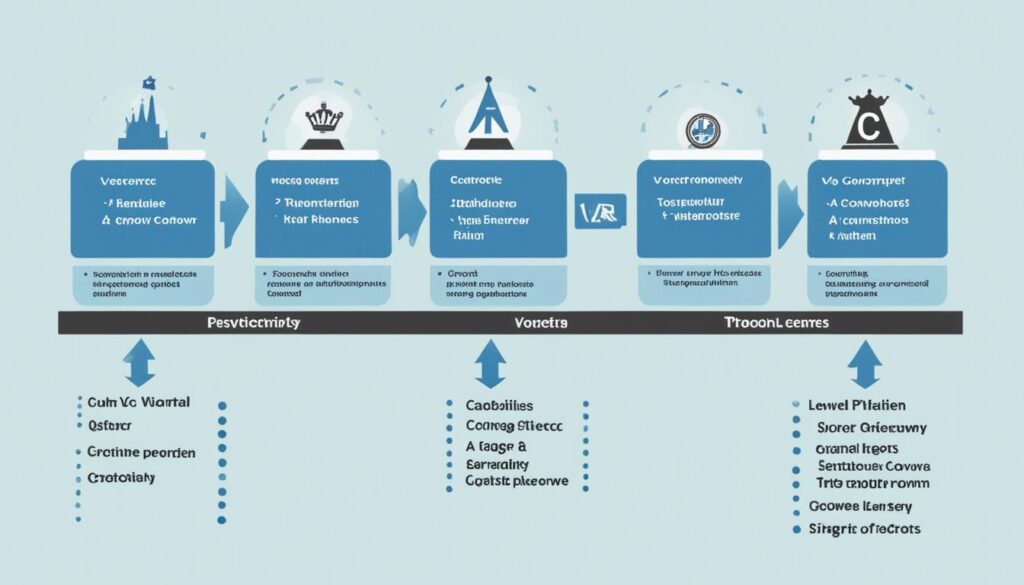
Salary and Compensation for VC Partners
Venture capital (VC) partners can earn a wide range of total compensation, typically between $500,000 to $2 million per year. This compensation structure is designed to attract and retain top talent in the highly competitive world of venture capital.
Base Salary Range
The base salary for a VC partner can range from the low six-figures up to $400,000, depending on factors such as the size of the VC fund, the partner’s experience, and the firm’s location.
Bonus Structure
In addition to the base salary, VC partners also receive a year-end bonus that is often 1-2 times their base salary. This bonus is typically tied to the performance of the VC fund and the partner’s individual contributions to the firm’s success.
Carried Interest and Profit-Sharing
However, the bulk of a VC partner’s potential earnings comes from carried interest, which is a share of the profits generated by the VC fund’s investments. If the firm’s portfolio companies perform well and generate significant returns, the VC partner’s carried interest can significantly increase their total compensation, often surpassing their base salary and bonus combined.

Factors Affecting VC Partner Earnings
The size of the venture capital fund a partner is associated with is a key factor in their earnings potential. Larger, more established VC funds typically have higher management fees and the opportunity to generate greater carried interest, leading to higher partner compensation.
Size of the Venture Capital Fund
The size of the VC fund plays a crucial role in determining the earnings of a partner. Partners associated with larger, more prominent venture capital funds have access to higher management fees and a greater potential to earn carried interest from successful investments. This can significantly boost their overall compensation.
Performance of the Fund’s Portfolio
The performance of the VC fund’s portfolio is another key factor that affects partner earnings. Partners whose funds generate strong returns and consistently outperform the market can command higher carried interest payouts, which can make up a substantial portion of their total compensation.
Experience and Track Record
A partner’s experience and track record in the venture capital industry also have a significant impact on their earnings potential. Partners with a proven history of successful investments, strong investor relationships, and a reputation for identifying promising startups are often able to command higher base salaries and larger carried interest allocations.
By understanding these factors affecting VC partner earnings, aspiring and current partners can better navigate the dynamics of the venture capital industry and optimize their compensation based on the size of their fund, the performance of their portfolio, and their own professional expertise and experience.
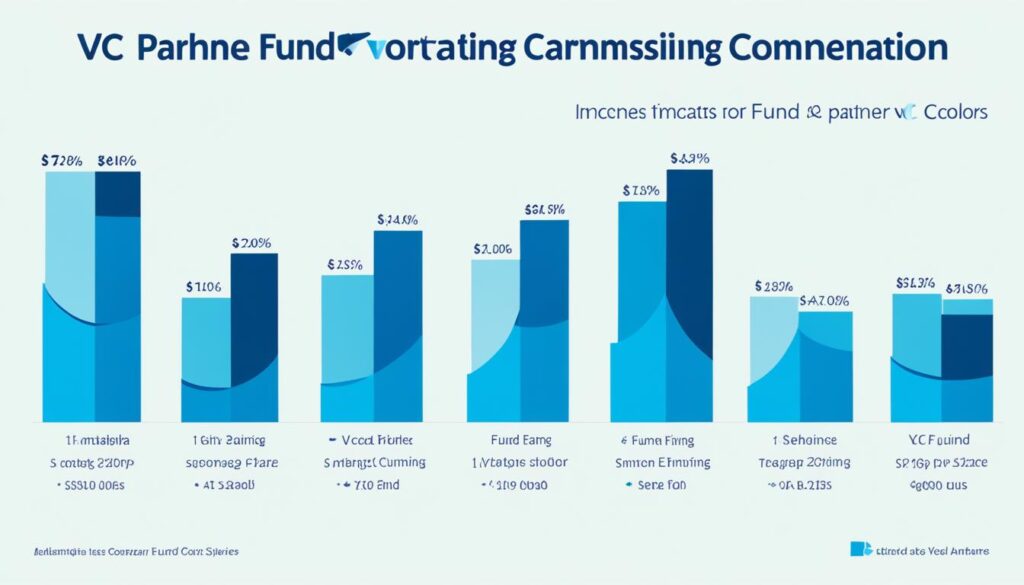
How much does a small VC partner earn?
The earnings of a small venture capital (VC) partner can vary significantly, but generally fall within the range of $200,000 to $1 million or more per year. Factors like the size of the fund, the performance of the firm’s portfolio, and the partner’s experience level all impact their total compensation.
For small VC firms, the typical small VC partner compensation may be on the lower end of this spectrum, potentially ranging from $200,000 to $500,000 annually. This is due to the smaller fund sizes and emerging portfolio companies these firms often work with, which can limit the potential for outsized carried interest payouts.
However, as the VC firm and its portfolio grow, so too can the earnings of a small VC partner. Partners at larger, more established VC funds have the opportunity to earn upwards of $1 million or more per year, especially if they have a proven track record of successful investments and portfolio company exits.
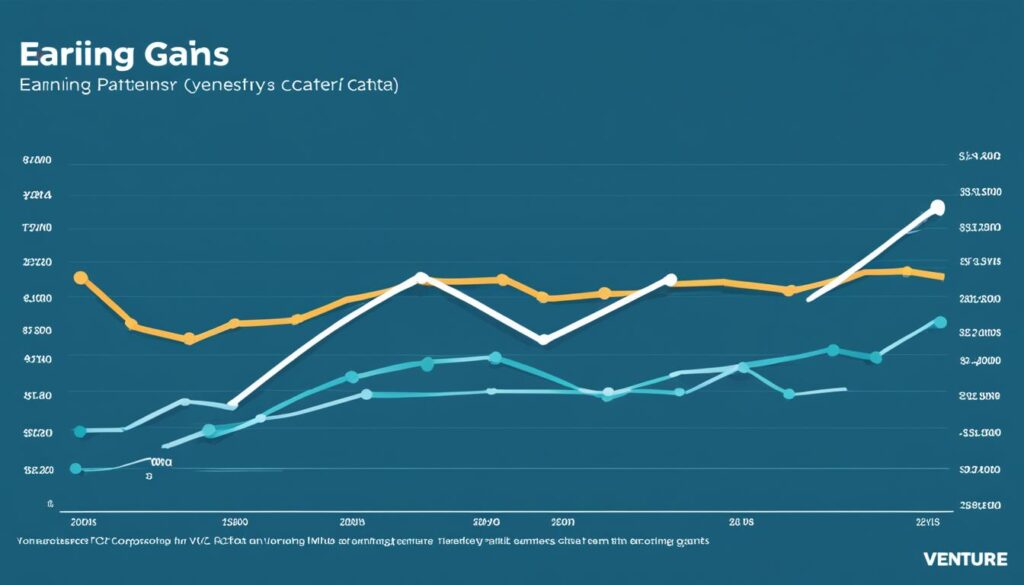
Ultimately, the small VC partner earnings and typical small VC partner compensation within this asset management field can vary greatly based on a variety of factors. But the potential to earn a sizable income as a VC partner remains a key draw for many finance professionals entering the venture capital industry.
Comparing VC Partner Earnings to Other Finance Roles
While venture capital partners can earn substantial compensation, their earnings often lag behind those of their counterparts in investment banking, private equity, and hedge funds. This discrepancy is primarily driven by the smaller fund sizes and longer investment horizons typically found in the venture capital industry.
Investment Banking
Investment banking is widely known for its high-pressure, fast-paced environment and the correspondingly high compensation levels. VC partner compensation vs investment banking can vary significantly, with investment banking managing directors often earning substantially more than even the most successful VC partners.
Private Equity
Similar to investment banking, private equity firms tend to have larger fund sizes and a more intense, deal-driven culture. This translates to higher potential earnings for VC partner pay vs private equity professionals, who can earn multi-million dollar paychecks through a combination of base salary, bonus, and carried interest.
Hedge Funds
Hedge fund managers, particularly those at the top-performing funds, can earn staggering amounts of compensation. While the VC partner earnings compared to hedge funds may not reach the same stratospheric levels, VC partners can still earn very lucrative incomes, especially those associated with the most successful venture capital firms.
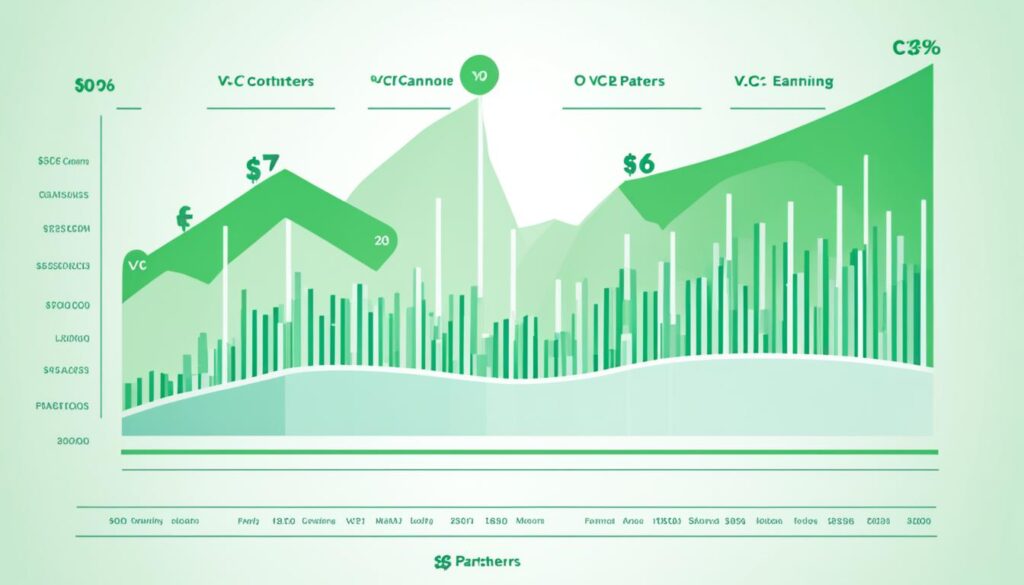
Career Path to Becoming a VC Partner
Aspiring to become a venture capital (VC) partner is an exciting career path for those passionate about startups, entrepreneurship, and high-growth potential investments. While the road to a VC partnership may not be straightforward, there are several common trajectories that individuals can take to reach this coveted position.
Entry-Level Roles
The typical entry points into the VC industry include post-undergraduate VC analyst roles and post-MBA associate positions. These junior-level roles provide valuable experience in areas like deal evaluation, startup sourcing, portfolio company management, and internal operations. Though they may not lead directly to partner-track positions, they serve as crucial training grounds for building the necessary skills and network to advance within the VC ecosystem.
Internal Promotions
Many successful VC partners have risen through the ranks from junior-level roles within their firms. By demonstrating exceptional deal-making abilities, strong industry relationships, and a proven track record of identifying high-potential startups, VC associates and principals can position themselves for internal promotions to the partner level over time.
External Hires from Startups and Industry
Another common path to becoming a VC partner is through external hires, particularly from the startup world or from senior roles at prominent technology, healthcare, or financial services companies. Individuals with substantial operational experience, a deep understanding of specific industries, and a proven entrepreneurial mindset are highly valued by VC firms seeking to bolster their investment teams.
| Entry Point | Key Qualifications | Potential Challenges |
|---|---|---|
| Pre-MBA VC Analyst | Experience in investment banking, consulting, or startup operations | Limited long-term career prospects within VC without further education or industry experience |
| Post-MBA VC Associate | Prior background in tech, healthcare, or finance, combined with an MBA | Strong competition for limited associate positions at top-tier VC firms |
| Senior-Level Hire | Substantial startup founding or executive experience, deep industry expertise | Requires extensive network and proven track record to be considered for senior VC roles |
Regardless of the entry point, becoming a VC partner requires a unique blend of technical expertise, strong communication skills, an entrepreneurial mindset, and a deep understanding of the startup ecosystem. By leveraging their experience and honing their investment acumen, aspiring VC professionals can navigate the various career paths to ultimately achieve the coveted role of a venture capital partner.

Lifestyle and Work-Life Balance
The VC partner lifestyle and work-life balance in the venture capital industry can vary, but in general, VC partners tend to have a less demanding schedule compared to professionals in investment banking or private equity. Venture capital partners typically work around 50-60 hours per week, with some travel required to attend conferences, meet with portfolio companies, and network within the work-life balance for VC partners.
Unlike the intense, high-pressure environments found in some other finance roles, VC partners often have more flexibility in their daily schedules. This allows them to better manage their VC partner lifestyle and maintain a healthier work-life balance for VC partners. Many VC firms also encourage their partners to take time off and recharge, understanding the importance of preventing burnout in this fast-paced industry.
That said, the demands of being a VC partner can still be significant, with the need to constantly evaluate new investment opportunities, provide strategic guidance to portfolio companies, and raise funds for the firm. The VC partner lifestyle requires a passion for the venture capital industry and a willingness to balance the various responsibilities that come with the role. Maintaining a healthy work-life balance for VC partners is an ongoing challenge, but one that many VC professionals are able to navigate successfully.

Geographical Differences in VC Partner Compensation
The compensation for venture capital partners can vary significantly based on the geographic location of the firm. Some of the key regional differences include:
Silicon Valley
As the epicenter of the venture capital industry, Silicon Valley is known for offering some of the highest compensation packages for VC partners. The robust startup ecosystem, concentration of venture capital firms, and intense competition for top talent in the region contribute to VC partner salaries in Silicon Valley that can reach upwards of $2 million or more per year.
New York
New York City has emerged as a strong secondary hub for venture capital activity, with a growing pool of startups and a thriving financial services industry. VC partner compensation in New York is generally lower than Silicon Valley, but still quite competitive, often ranging from $800,000 to $1.5 million annually.
Boston
Boston is another major center for venture capital, with a concentration of top-tier universities, research institutions, and a diverse array of startups. VC partner salaries in Boston tend to be slightly lower than Silicon Valley and New York, typically falling within the $600,000 to $1.2 million range, reflecting the slightly smaller scale of the local venture capital ecosystem.
| Location | Typical VC Partner Compensation Range |
|---|---|
| Silicon Valley | $1 million – $2 million+ |
| New York | $800,000 – $1.5 million |
| Boston | $600,000 – $1.2 million |
These regional variations in VC partner compensation by location are driven by factors such as the size and maturity of the local venture capital market, the availability of top talent, and the overall cost of living in each region. Professionals in areas with more significant venture capital activity and a higher concentration of successful startups can expect to earn higher salaries and bonuses compared to their counterparts in less active markets.

Trends and Future Outlook
The venture capital industry has witnessed remarkable growth and evolution in recent years, and these changes are poised to impact the future earnings potential of VC partners. As the future of VC partner compensation and trends in VC partner earnings continue to unfold, a few key developments are worthy of note:
One notable trend is the increasing institutionalization of the VC industry, with larger and more established funds commanding higher management fees and generating greater carried interest opportunities for partners. This shift towards institutional capital is likely to drive up partner compensation at the top-tier firms, further widening the gap between the highest and lowest earners in the VC space.
Another emerging trend is the growing emphasis on diversity and inclusion within venture capital. As firms seek to better reflect the communities they serve, there may be increased pressure to ensure fair and equitable compensation structures for VC partners, regardless of gender, race, or background. This could lead to more transparency around VC partner earnings and potentially narrow the pay disparities within the industry.
Additionally, the rise of alternative investment vehicles, such as venture debt, secondary markets, and direct-to-consumer funds, may create new avenues for VC partners to generate income and boost their overall compensation packages. As these innovative strategies gain traction, the traditional VC model may evolve, potentially reshaping the future of VC partner earnings.
Overall, the trends in VC partner earnings and the future of VC partner compensation will likely be shaped by a combination of industry consolidation, diversity initiatives, and the emergence of new investment opportunities. As the venture capital landscape continues to transform, VC partners will need to adapt their skill sets and strategies to remain competitive and capitalize on the changing dynamics of the industry.
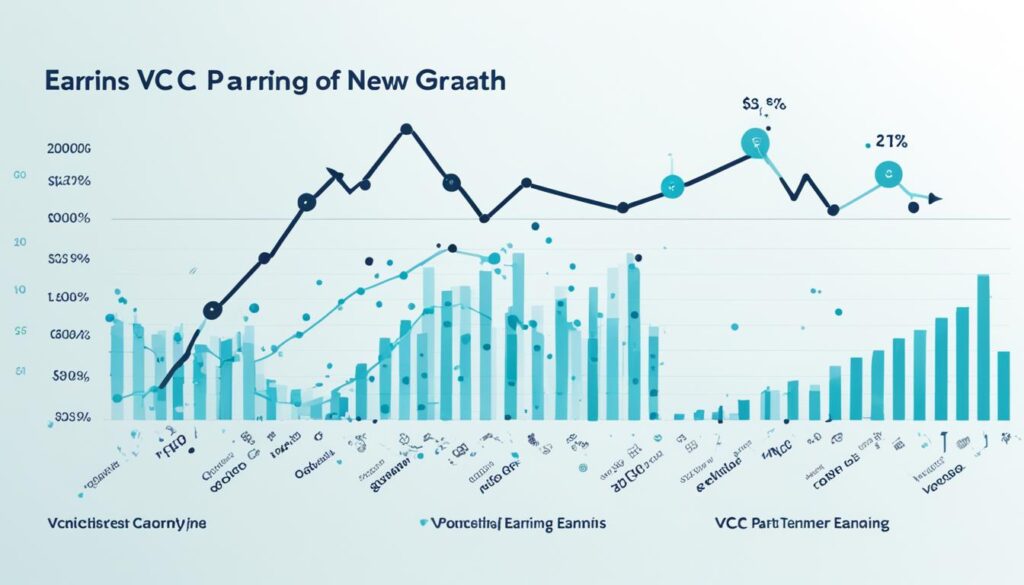
Conclusion
In conclusion, the earnings potential for venture capital partners can be substantial, with total compensation ranging from $500,000 to over $2 million per year. However, this wide range is driven by a variety of factors, including the size and performance of the VC fund, the partner’s experience and track record, and the geographic location of the firm.
As highlighted throughout this guide, venture capital partners can earn lucrative salaries, reflecting the specialized skills and expertise required in this dynamic industry. Compensation packages typically consist of a base salary, performance-based bonuses, and carried interest or equity from successful investments. Factors such as education, experience, specialization, and market size all contribute to the significant earning potential for VC professionals.
While venture capital partners may not earn as much as their counterparts in investment banking or private equity, the opportunity to participate in the success of innovative startups and shape the future of technology makes it an attractive career path for many. By understanding the various components of VC compensation and the key drivers behind it, aspiring professionals can better navigate the industry and position themselves for long-term success. For more information on venture capital careers and salaries, visit venturecapitalcareers.com.
FAQ
How much does a small VC partner earn?
FAQ
How much does a small VC partner earn?
A small VC partner’s earnings can vary greatly, but typically range from 0K to
FAQ
How much does a small VC partner earn?
A small VC partner’s earnings can vary greatly, but typically range from $200K to $1M+ annually. This compensation is based on factors such as the size of the venture capital fund, the performance of the fund’s portfolio, and the partner’s experience and track record.
What is a Venture Capital Partner?
Venture capital partners are senior-level professionals at VC firms who are responsible for raising funds, sourcing and evaluating investment opportunities, serving on portfolio company boards, and managing the firm’s public relations. They have significant decision-making power and are less involved in day-to-day deal execution compared to junior VC professionals like Associates and Principals.
What are the roles and responsibilities of a VC Partner?
VC partners are responsible for raising funds, sourcing and evaluating investment opportunities, serving on portfolio company boards, and managing the firm’s public relations.
What is the hierarchy in Venture Capital Firms?
The typical hierarchy in venture capital firms includes junior roles like Associates and Principals, and senior roles like Partners who have significant decision-making power.
What is the salary and compensation structure for VC Partners?
VC partners can earn a wide range of total compensation, typically between $500,000 to $2 million per year. This includes a base salary, which can range from the low six-figures up to $400,000, and a year-end bonus that is often 1-2x the base salary. However, the bulk of a VC partner’s potential earnings comes from carried interest, which can significantly increase their total compensation if the firm’s investments perform well.
What factors affect the earnings of a VC Partner?
The size of the venture capital fund a partner is associated with, the performance of the firm’s portfolio, and the partner’s experience level are all key factors that impact their total compensation.
How do the earnings of a small VC partner compare to other finance roles?
On average, VC partners earn less than their counterparts in investment banking, private equity, and hedge funds. This is primarily due to the smaller fund sizes and longer investment horizons in venture capital compared to these other finance roles.
What are the common career paths to becoming a VC Partner?
There are a few common paths to becoming a venture capital partner, including entry-level roles, internal promotions, and external hires from startups and industry.
What is the lifestyle and work-life balance like for VC Partners?
The lifestyle and work-life balance of venture capital partners can vary, but in general, they tend to have a less demanding schedule compared to investment bankers or private equity professionals. VC partners typically work around 50-60 hours per week, with some travel required.
How does VC partner compensation differ by geographic region?
The compensation for venture capital partners can vary significantly based on the geographic location of the firm, with some of the key regional differences including Silicon Valley, New York, and Boston.
What are the trends and future outlook for VC partner earnings?
The venture capital industry has experienced significant growth and evolution in recent years, and this is likely to impact the future earnings potential of VC partners.
M+ annually. This compensation is based on factors such as the size of the venture capital fund, the performance of the fund’s portfolio, and the partner’s experience and track record.
What is a Venture Capital Partner?
Venture capital partners are senior-level professionals at VC firms who are responsible for raising funds, sourcing and evaluating investment opportunities, serving on portfolio company boards, and managing the firm’s public relations. They have significant decision-making power and are less involved in day-to-day deal execution compared to junior VC professionals like Associates and Principals.
What are the roles and responsibilities of a VC Partner?
VC partners are responsible for raising funds, sourcing and evaluating investment opportunities, serving on portfolio company boards, and managing the firm’s public relations.
What is the hierarchy in Venture Capital Firms?
The typical hierarchy in venture capital firms includes junior roles like Associates and Principals, and senior roles like Partners who have significant decision-making power.
What is the salary and compensation structure for VC Partners?
VC partners can earn a wide range of total compensation, typically between 0,000 to million per year. This includes a base salary, which can range from the low six-figures up to 0,000, and a year-end bonus that is often 1-2x the base salary. However, the bulk of a VC partner’s potential earnings comes from carried interest, which can significantly increase their total compensation if the firm’s investments perform well.
What factors affect the earnings of a VC Partner?
The size of the venture capital fund a partner is associated with, the performance of the firm’s portfolio, and the partner’s experience level are all key factors that impact their total compensation.
How do the earnings of a small VC partner compare to other finance roles?
On average, VC partners earn less than their counterparts in investment banking, private equity, and hedge funds. This is primarily due to the smaller fund sizes and longer investment horizons in venture capital compared to these other finance roles.
What are the common career paths to becoming a VC Partner?
There are a few common paths to becoming a venture capital partner, including entry-level roles, internal promotions, and external hires from startups and industry.
What is the lifestyle and work-life balance like for VC Partners?
The lifestyle and work-life balance of venture capital partners can vary, but in general, they tend to have a less demanding schedule compared to investment bankers or private equity professionals. VC partners typically work around 50-60 hours per week, with some travel required.
How does VC partner compensation differ by geographic region?
The compensation for venture capital partners can vary significantly based on the geographic location of the firm, with some of the key regional differences including Silicon Valley, New York, and Boston.
What are the trends and future outlook for VC partner earnings?
The venture capital industry has experienced significant growth and evolution in recent years, and this is likely to impact the future earnings potential of VC partners.
